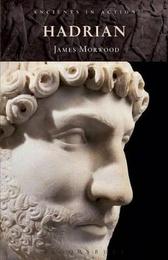
|
Hadrian
Paperback / softback
Main Details
| Title |
Hadrian
|
| Authors and Contributors |
By (author) James Morwood
|
| Series | Ancients in Action |
|---|
| Physical Properties |
| Format:Paperback / softback | | Pages:152 | | Dimensions(mm): Height 216,Width 138 |
|
| ISBN/Barcode |
9781849668866
|
| Classifications | Dewey:937.07092 |
|---|
| Audience | | Tertiary Education (US: College) | | Primary & Secondary Education | |
|---|
| Illustrations |
26 bw illus
|
|
Publishing Details |
| Publisher |
Bloomsbury Publishing PLC
|
| Imprint |
Bloomsbury Publishing PLC
|
| Publication Date |
15 August 2013 |
| Publication Country |
United Kingdom
|
Description
The Roman emperor Hadrian, who lived from 76 to 138 AD was a hugely influential figure whose architectural legacy is obvious even today. However, he was also contradictory and mysterious: he was a Spaniard who became emperor at Rome; he was a popular, successful soldier who aimed to be a man of peace. He dabbled in black magic, and he courted scandal: as well as his bitterly unhappy marriage, he had a very public love affair with Greek boy, who died in mysterious circumstances surrounded by rumours of human sacrifice.This title explores these contradictions and complexities, and pieces together the picture of a man, his life, times and influence. It presents a rounded picture written in a lively and accessible style. Looking in detail at key themes and topics of Hadrian's life, the title explores his Spanish background, his military service and initiatives of peace, his architectural legacy such as the Pantheon, his villa at Tivoli, his love of Athens and Athenian culture, his relationship with Antinous, and how he dealt with Christians and Jews. In addition to this, the title covers social aspects of life in the Roman empire in the second century: slavery, Roman baths and hygiene, the public spectacles of circus races, gladiatorial fights and animal hunts.
Author Biography
James Morwood was Head of Classics at Harrow School for seventeen years. He then moved to Oxford University and took charge of the language teaching for the Classics Faculty. He retired from this role in 2003. His books include The Oxford Pocket Latin Dictionary (1994, revised edition 2005); A Latin Grammar (1999), Oxford Grammar of Classical Greek (2001), The Plays of Euripides (Bloomsbury, 2002), The Pocket Oxford Dictionary of Classical Greek (2002), Advanced Latin (Bloomsbury, 2009) and The Oxford Latin Course, College edition (2012).
ReviewsThis very readable, engaging book is an excellent introduction to the emperor Hadrian ... It is detailed, covering an astonishing number of aspects of second-century Roman life; it is enlivened by humour, the author's personal experience, and modern comparisons. Most importantly, it provides a well-rounded, enlightening picture of Hadrian and his world. It is an essential introduction to the subject and would benefit readers from high-school age to seasoned academics. * Classics Ireland * An excellent and highly readable account of this fascinating emperor [that] includes enough background for the story to be fully comprehensible to anyone new to Roman history * Classics for All Reviews * This book is beautifully written and richly informative. It offers readers a good mixture of ancient sources and modern scholarship. -- Robert Gurval, University of California, USA James Morwood's Hadrian is the perfect introduction to this fascinating and elusive emperor. Morwood has given us a wonderful panorama of the Roman empire at its zenith, based on complete mastery of the modern scholarship. Lucid, accessible, and beautifully written, this book deserves the widest possible readership. -- Peter Thonemann, Wadham College, Oxford, UK Hadrian, "the most remarkable of all the Roman emperors" (as a famous historian called him a century ago), was regarded as a strange and baffling figure even by his second century AD contemporaries. James Morwood has produced a well-written and coherent introduction, with very up to date bibliography. He steers his way in sovereign fashion through the fragmentary sources as he follows Hadrian around the empire and manages to bring him to life. -- Professor Anthony Birley, Newcastle University, UK
|